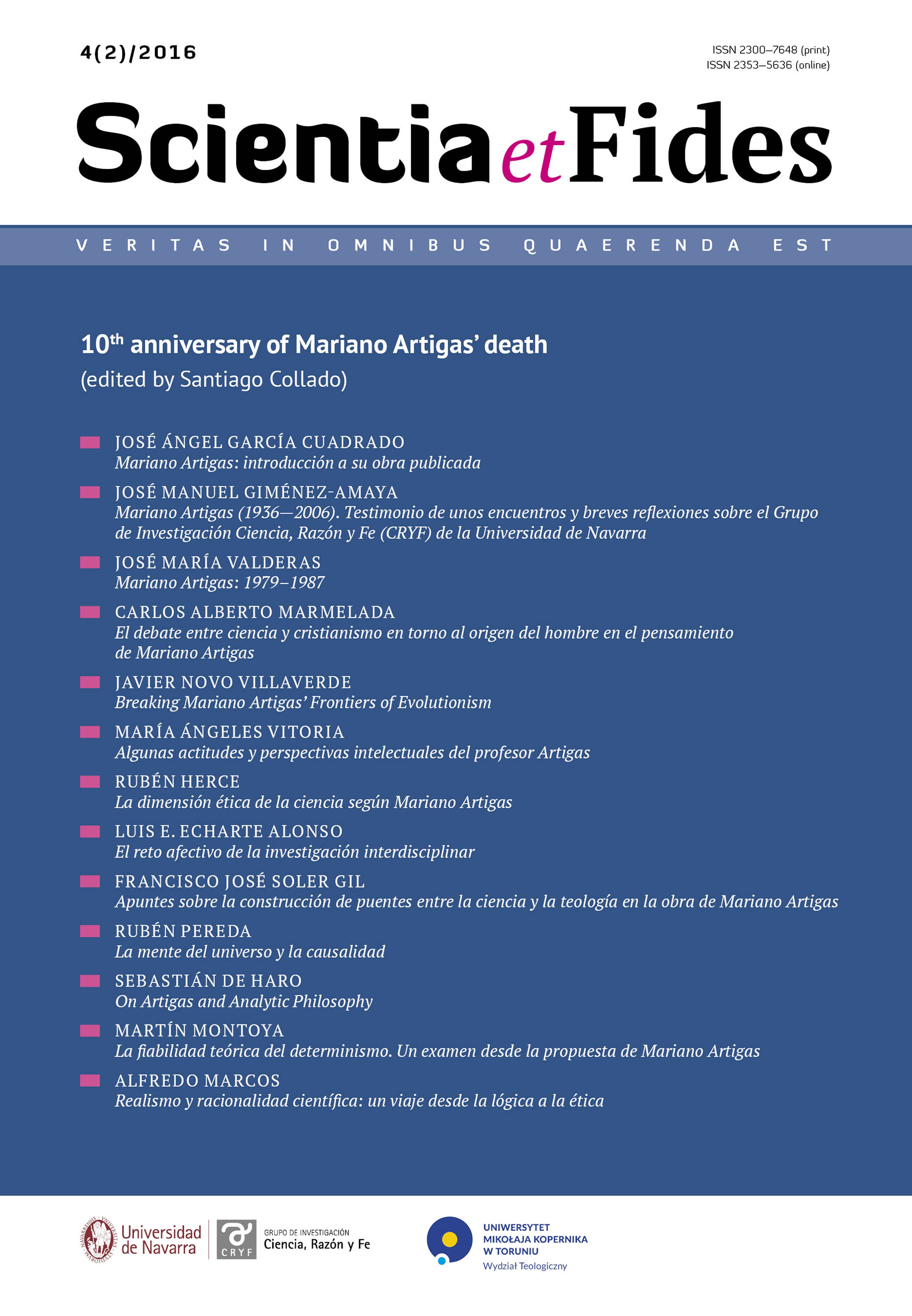Racionalidad de la inducción como minimización entrópica
Keywords
induction, postulates, scientific theory, realism, algorithmic entropyAbstract
Rationality of induction as entropic minimization
In favour of a fundamental aspect of the epistemology of Mariano Artigas –his commitment to the quest for truth on the part of the scientific theory– I argue about the rationality of the process of induction, both the induction of general laws from particular facts of experience and the inference of postulates from the experimental laws which form the empirical basis of the theory. This is argued by showing that we minimize the entropy of the information when making an induction, so that we just do what usually the reason does.
References
Agazzi, E. 1969. Temi e problemi di filosofia della fisica. Milano: C. Manfredi Editore.
Artigas, M. 1992. Ciencia y fe. Nuevas perspectivas. Pamplona: Eunsa.
Artigas, M. 1994. El desafío de la racionalidad. Pamplona: Eunsa.
Artigas, M. 1999. Filosofía de la ciencia experimental. La objetividad y la verdad en las ciencias. Pamplona: Eunsa.
Comte, A. 1981. Curso de Filosofía Positiva. Buenos Aires: Aguilar.
Duhem, P. 2003. La teoría física: su objeto y su estructura. Herder: Barcelona. Originalmente publicado como Duhem, P. 1914. La théorie physique. Son objet, sa structure. Paris: Vrin.
Feyerabend, P. K. 1989. Contra el método. Esquema de una teoría anarquista del conocimiento. Barcelona: Ariel. Originalmente publicado como Feyerabend, P. K. 1974. Against Method. Outline of an Anarchistic Theory of Knowledge. Minneapolis: University of Minnesota.
Heidegger, M. 1967. Ser y tiempo. México: FCE. Originalmente publicado como Heidegger, M. 1927. Sein und Zeit. Tübingen: Max Niemeyer Verlag.
Heisenberg, W. 1971. Physique et philosophie. Paris: Éditions Albin Michel. Originalmente publicado como Heisenberg, W. 1958. Physics and phylosophie. New York: Harper & Brothers.
Hume, D. 2004. Investigación sobre el entendimiento humano. Madrid: Istmo. Originalmente publicado como Hume, D. 1748. An Enquiry concerning Human Understanding. London: A. Millar.
Kant, I. Crítica de la Razón Pura. México: Porrúa. Originalmente publicado como Kant, I. 1781. Kritik der reinen Vernunft. Riga: Johann Friedrich Hartknoch.
Kuhn, T. 1987. La estructura de las revoluciones científicas. México: FCE. Originalmente publicado como Kuhn, T. 1962. The structure of scientific revolutions. Chicago: University of Chicago Press.
Lakatos, I. 1999. Escritos filosóficos. Matemáticas, Ciencia y Epistemología. Alianza Editorial, 1999. Madrid. Originalmente publicado como Lakatos, I. 1978. Mathematics, Science and Epistemology – Philosophical Papers, vol. 2. Cambridge, Mass.: Cambridge Univesity Press.
Mach, E. 1960. The Science of Mechanics. Chicago: The open court publishing co. Originalmente publicado como Mach, E. 1883. Die Mechanik in Ihrer Entwicklung Historisch-Kritisch Dargestellt. Leipzig: F. A. Brockhaus.
Newton, I. 1998. Principios Matemáticos de la Filosofía Natural. Madrid: Alianza Editorial. Originalmente publicado como Newton, I. 1687. Philosophiae naturalis principia mathematica. Londini: Josephi Streater.
Poincaré, H. 1968 [1902]. La science et l’hypothèse. Paris: Flammarion.
Popper, K. 1985. La logique de la découverte scientifique. Paris: Éditions Payot. Originalmente publicado como Popper, K. 1959. The logic of scientific discovery. London: Hutchinson.
Wittgenstein, L. 1997. Tractatus Logicus Philosophicus. Madrid: Alianza Editorial. Originalmente publicado en Wittgenstein, L. 1922. Tractatus Logicus Philosophicus. London: Routledge and Kegan Paul.
Zubiri, J. 1994 [1942]. Naturaleza, Historia, Dios. Madrid: Alianza Editorial.
Downloads
Published
How to Cite
Issue
Section
License
CC BY ND 4.0. The Creator/Contributor is the Licensor, who grants the Licensee a non-exclusive license to use the Work on the fields indicated in the License Agreement.
- The Licensor grants the Licensee a non-exclusive license to use the Work/related rights item specified in § 1 within the following fields: a) recording of Work/related rights item; b) reproduction (multiplication) of Work/related rights item in print and digital technology (e-book, audiobook); c) placing the copies of the multiplied Work/related rights item on the market; d) entering the Work/related rights item to computer memory; e) distribution of the work in electronic version in the open access form on the basis of Creative Commons license (CC BY-ND 3.0) via the digital platform of the Nicolaus Copernicus University Press and file repository of the Nicolaus Copernicus University.
- Usage of the recorded Work by the Licensee within the above fields is not restricted by time, numbers or territory.
- The Licensor grants the license for the Work/related rights item to the Licensee free of charge and for an unspecified period of time.
FULL TEXT License Agreement
Stats
Number of views and downloads: 557
Number of citations: 1



